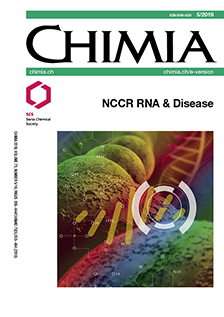Development of a DNA-based Assay to Detect and Quantify Tropane Alkaloids Producing Thornapple Contaminations in Processed Food
FH-HES Universities of Applied Sciences
DOI:
https://doi.org/10.2533/chimia.2019.422PMID:
31118128Keywords:
Datura stramonium, Millet food preparation, Realtime pcr, Specific hydrolysis probe, Tropane alkaloidsAbstract
Contaminates such as pesticides, toxic molecules of natural origin, genetically modified organisms and others can occur in processed food, especially if the main ingredient grows in open fields exposed to the environment. In particular, some health threatening toxic compounds are natural ingredients of plants that grow wild next to vegetables intended for consumption and can therefore enter the crop yield and stay there undetected. The tropane alkaloids-containing nightshade thornapple Datura stramonium, often grows in close vicinity to millet (Panicum miliaceum) a widely cultivated cereal, representing an important nutrient source in different countries of Asia and Africa. Discriminating thornapple from millet during harvest is not easy and consequently, millet-containing food products are often contaminated with tropane alkaloids from thornapple. In this work, two DNA specific hydrolysis probe qPCR methods were developed for Datura stramonium and Panicum miliaceum in order to detect thornapple contamination in millet-containing food products. The specificity and sensitivity of the developed assay system allows for its application in screenings during food product testing.Downloads
Published
2019-05-29
Issue
Section
Columns, Conference Reports
Categories
License
Copyright (c) 2019 Swiss Chemical Society

This work is licensed under a Creative Commons Attribution-NonCommercial 4.0 International License.
How to Cite
[1]
A. Weston, P. Brodmann, M. Widmer, J. Bartel, E. Kübler, Chimia 2019, 73, 422, DOI: 10.2533/chimia.2019.422.







